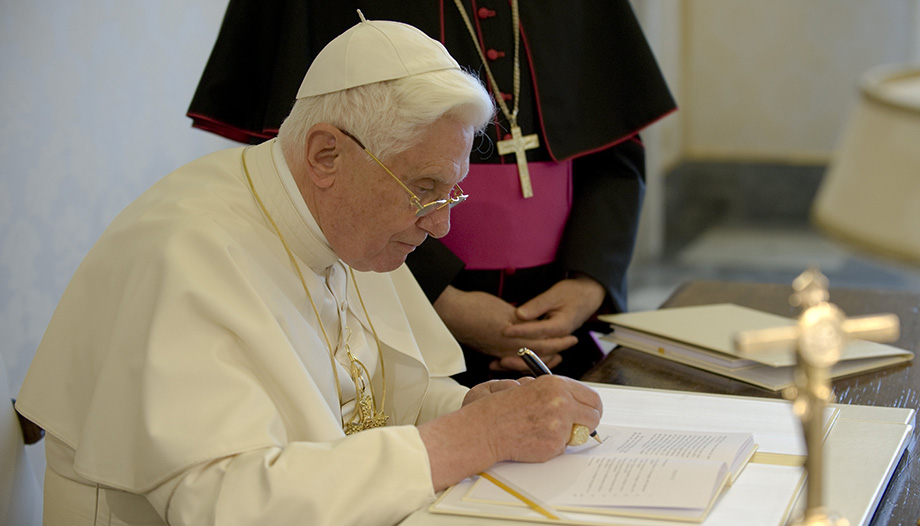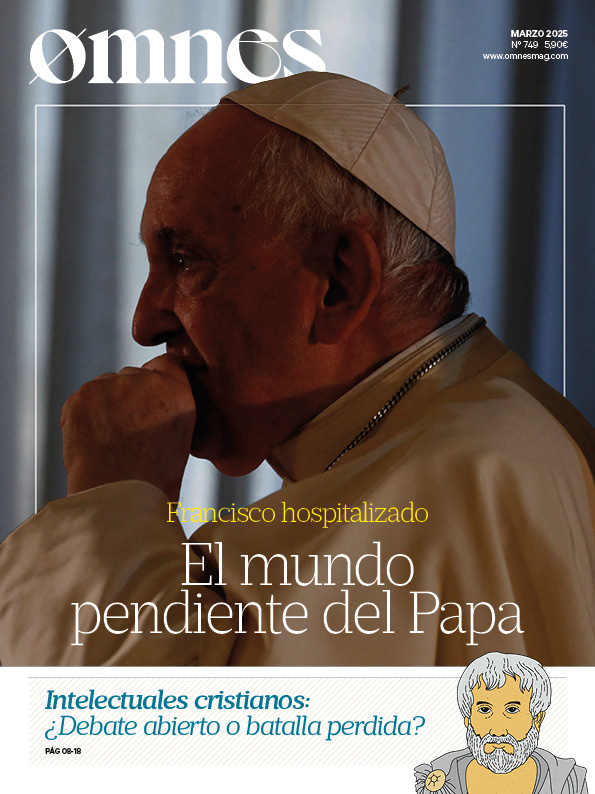Benedict XVI has not only been "the pope of reason," but also the pope of love and hope, judging by the titles of his encyclicals. He has also been "the pope of the word", because of the inspiring speeches and homilies he has delivered during his brief but intense pontificate.
In these lines, we will focus mainly on the encyclicals and apostolic exhortations, in order to present a unified vision of the program of his pontificate.
Love, truth and hope
These are the three central pillars of his magisterium. Benedict XVI began his first encyclical, entitled Deus caritas est, dated Christmas Day 2005. First of all, love. He presented there a "revolution of love" that has not yet succeeded completely in our small world. There is still hunger, poverty, injustice and innocent deaths. For this "revolution of love" to be carried out once and for all, he reminded us, we must not forget two words: God and Christ.
Jesus Christ is "the love of God incarnate," which is made concrete not only in charity towards others, but above all on the cross and in the Eucharist. This is the source of all our love for God and neighbor: all true love and charity come from God. The eros can be transformed into agape Christian, after a process of purification. This is something that the Church could not forget and should remind this somewhat cruel world. Love can change the world, Benedict XVI repeated with a certainty that should make us think.
Then came a new encyclical, this time on hope. It appeared on November 30, the feast of St. Andrew, the apostle to whom Easterners profess a special devotion, and on the eve of Advent, a time of hope. Benedict XVI published this second encyclical on the second theological virtue, after the one dedicated to charity. He who, as prefect, had been the "guardian of the faith", now showed himself to be the pope of love and hope.
The title was taken from St. Paul: spe salvisaved by hope" (Rom 8:24). In the new encyclical, there was a marked ecumenical tone, especially when it referred to the doctrine of purgatory, in which it made explicit mention of Orthodox theology and presented it with a personalistic and Christocentric approach that was easy to understand (cf. n. 48).
Purgatory is an encounter with Christ who embraces and purifies us. At the same time, the German pope proposed a critical dialogue with a modernity that seeks hope.
Unlike the encyclical on hope, which was personally written by the pope from the first to the last line, in the Caritas in veritate many minds and hands had worked on it. Benedict XVI had left his mark on it, already visible in the words of the title that indissolubly combine charity and truth, a decidedly Ratzingerian proposal. "Injecting the world with more truth and love," summed up a newspaper headline. "Only with charity - enlightened by faith and reason - is it possible to achieve development goals endowed with human value," the German pope affirmed.
It was the first social encyclical of his pontificate, published eighteen years after John Paul II's last social encyclical, Centesimus annusof 1991. Newspapers, radio and television stations around the world were eager to hear what the pope had to say about the current economic situation. Caritas in veritateHowever, he went beyond the crisis. "The present difficulties will pass in a few years, but the message of the encyclical will remain," Monsignor Martino guaranteed.
Bread and Word
Sacramentum caritatis, sacrament of love: this was the title of the German pope's apostolic letter on the Eucharist, which was the result of the synod of bishops held in Rome in October 2005. It was a meeting convened by John Paul II for the whole Church to reflect on what is "its center and summit". Jesus is there," he recalled: "the Eucharist is Christ himself and, therefore, the Eucharist "makes the Church," as St. John Paul II had written.
Now, as a mature fruit, this apostolic exhortation came out as a continuation of Benedict XVI's first and until then last encyclical, significantly entitled God is love. He had spoken of the Eucharist as the ultimate manifestation of love on the part of Jesus and as the center of the whole Church. The synod's proposals had already been published in internetThe new apostolic letter, at the request of Pope Ratzinger himself, was not a big surprise. It was a matter of applying what Vatican II had already said, the new apostolic letter insisted.
On September 30, 2010, the feast of St. Jerome, a new document was published entitled Verbum Domini, the word of the Lord. The theme was logically Scripture and was a mature fruit of the synod that had taken place two years earlier on this same topic.clearly, as did the participants in the synod, he emphasized first of all that "the Christian faith is not a "religion of the Book": Christianity is the "religion of the word of God", not of a written and mute word, but of the incarnate and living Word" (n. 7).
Christianity is not the religion of a Book (as Judaism or Islam can be), but of a Person: that of Jesus Christ, true God and true man. However, this Person - Jesus Christ - had spoken at length and preached sublime parables. The word of God is a direct access to the Son of God, who constitutes the summit of all revelation, the Word made flesh.
New evangelization
After laying the foundations on love, truth and hope, as well as the places where Jesus Christ is found - the Bread and the Word - Benedict XVI launched into the "new evangelization" already proposed by John Paul II.
The post-synodal apostolic exhortation Africae munus (2011) brought together the fruits of the work of the Second Special Assembly for Africa of the Synod of Bishops. "Africa, land of a new Pentecost, have confidence in God [...] Africa, Good News for the Church, make it so for the whole world," the Pope said there. The 138-page document contains a wide variety of topics, but it can be summarized in a single point: to remain on the spiritual plane, so as not to become a Catholic party. According to Benedict XVI, the role in favor of reconciliation, justice and peace can be maintained if the Church remains faithful to its spiritual mission, reconciling humanity with God and with one another through Christ.
At Porta fidei (2011), the German pope announced the Year of Faith, in perfect continuity with the new evangelization, in the context of the Second Vatican Council, fifty years after its beginning. In this sense, today's Christian has two privileged instruments at his disposal to concretize and carry out this new evangelization: the Council, which is now fifty years old; and its Catechismpromulgated by John Paul II. "In order to have access to a systematic knowledge of the content of the faith, everyone can find in the Catechism of the Catholic Church a precious and indispensable subsidy. It is one of the most important fruits of the Second Vatican Council" (n. 11), his successor added. The Year of Faith was the year of the Council and its catechism.
Faith is "a great yes" that contains and implies in turn the whole of human existence. Faith and life, belief and experience are mutually intertwined in the act of faith. Evangelization thus consists first of all in showing the beauty and rationality of faith, in bringing the light of God to the people of our time with conviction and joy. Time will give us this first text of Pope Francis, Lumen fidei (2013), an encyclical "written by four hands" and which constituted the culmination of the Year of Faith. Faith, hope and charity constituted the legacy of Benedict XVI's pontificate, which contained at its core Jesus Christ himself present in the Bread and the Word. With this we were perfectly equipped for the new evangelization of this world now in crisis.








